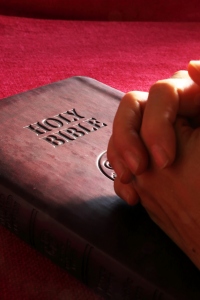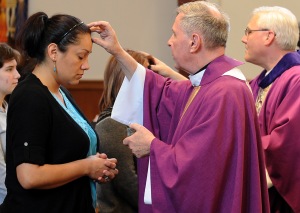Be joyful in hope, patient in affliction, faithful in prayer. (Romans 12:12)
On a cold, windy evening in Chicago, I was trudging home with two sackfuls of groceries in my arms. Things weren’t going well. I hadn’t lived there long, was lonely and unsettled, and felt the weight of past mistakes pulling down my hopes, self-esteem, and finances. It was the fall of 2009, and I had no idea where to turn.
My disillusionment kept me staring at the sidewalk as I headed toward my apartment. Stopping mid-step was the last thing I had planned to do. But something (and now I know it was Someone) caused me to halt.
As I stood there, impatient Chicagoans weaving around me, I slowly looked up to reorient myself. I was on the right street, but I was standing in front of a building I hadn’t noticed before.
It was a church.
How many times in the last six months had I walked by it and not seen it? And yet, something (Someone) made me stop in front of it that night.
It was dark out and getting kind of late, but there were lights on inside. Barely aware of my feet moving, I walked in, melting groceries and all.
A nice man in the lobby walked up to me. “Can I help you?”
I stammered a bit. “I don’t really know why I’m here. I saw the light on.”
He smiled. “We’re glad you came. Would you like to talk to someone or would you like to spend some time alone in the sanctuary?”
Solitude sounded good. He led me in and gave me some privacy. “Stay as long as you’d like,” he said.
I put my groceries down and sat. It was beautiful and peaceful. The feeling of serenity lasted about two minutes, and then perfectionism set in.
How do I pray? What am I supposed to say? There must be some structure or order to this that I don’t know. What if I don’t say the right things and He doesn’t hear me?
Feeling too embarrassed to ask the nice man for some tips, I decided to wing it.
I talked to God. And while I had felt like I needed to say a perfect prayer, what I did instead was be real with Him. And it turned out that being real was all He wanted.
Since then, I’ve prayed a lot. And although I love glorifying God through the precise, formal prayers we say in church, I’ve come to treasure the imperfect everyday prayers I lift up to Him in private. Here are a few things I’ve learned:
Prayer is about gratitude as much as, if not more so, than requests. It took me awhile to realize that prayer isn’t just a vehicle for asking God for help. That’s part of it, but it’s also about thanking Him for His infinite blessings. Interestingly, I’ve found that the more I thank Him, the less I feel I need to ask of Him. Whatever I’m worried about, I know that He has a loving, intentional plan for me. Knowing this helps me turn matters over to Him instead of trying to mold my life in ways that are beyond my own understanding.
Prayer is messy. I don’t ever know what I’m going to say, even if I think I do. And that’s okay. To me, it means that God is letting me know in the moment that He is listening and ready for me to go deeper. I pray at odd times and in unexpected places in addition to my daily time set aside just for prayer. Oftentimes, I think I’m done, only to say, “Oh yeah, and God? I forgot to tell you…” And that’s okay, too.
Prayer is authentic. If you can believe it, I used to try to hold it together when I prayed. I thought that if I was upset or lost my composure, I would be letting down God. That’s how warped my thinking had become from worldly pressures and societal expectations. But over time, I learned that God wants me to show Him exactly how I am in that moment — no sugar-coating allowed. And so, I’ve prayed while holding my head in my hands, crying. I’ve yelled. I’ve sobbed to the point of an inarticulate garble that any human would be unable to decipher. But God knew exactly what I was saying. I’ve often finished a prayer and then thought, “Did I really just say that?” Yep, I did. And best of all, I said it to the One who is completely, infinitely trustworthy with my worst demons.
Devote yourselves to prayer, being watchful and thankful. (Colossians 4:2)
As a late bloomer, it took me awhile to learn that there’s no such thing as the perfect prayer. But we are perfect in His eyes, and He loves to hear from us — even when it’s really messy. In these imperfect everyday words with God, when we are watchful as well as thankful, the power of prayer is illuminated to us in ways we never could have imagined.







